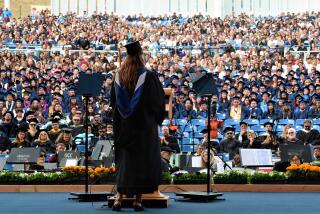$230 Million in Stanford Charges Detailed in Audit : Finances: University says it will contest the findings by the Defense Department. Upcoming reviews could bring total of disputed research overhead costs to $300 million.
- Share via
Defense Department auditors have determined that Stanford University may have overbilled the federal government by $230 million in research overhead costs between 1980 and 1988, according to congressional investigators. Stanford officials said the school would strongly contest such findings.
The Defense Contract Audit Agency (DCAA) has concluded that about $230 million spent on utilities, library and administrative costs related to Stanford research was not properly documented or should not have been charged to the government, according to an investigator for U.S. Rep. John D. Dingell’s House Energy and Commerce Committee, which held hearings last year on Stanford’s spending.
Upcoming DCAA reviews of 1989 and 1990 may bring the total to $300 million, about half the overhead reimbursement the school received over 10 years, he said.
The Dingell staffer, who asked not to be identified, said the audits generally support the claims of Paul Biddle, the Navy representative on Stanford’s campus who blew the whistle on the school’s use of federal research dollars. Biddle contends that Stanford overcharged the government $480 million over the past decade, including $280 million for employee benefits and properties not reviewed in the current audits.
The audits have not been publicly released and DCAA officials declined to comment on them Thursday. Another government source close to the investigation confirmed the $230-million figure.
Stanford’s chief financial officer, Peter Van Etten, said he had not seen the reports or formally been notified about them. However, Van Etten stressed that Stanford will challenge the audits--first with the Office of Naval Research, the agency which governs federal research funds on campus, and then possibly in court. The Defense audits are advisory to the Navy office.
Central to Stanford’s rebuttal is that much of the questioned costs were covered by so-called memoranda of understanding, the many agreements Stanford had with the Navy that established reimbursement for research overhead and excused the school from regular audits. The recent DCAA audits reportedly disregarded those agreements.
“We just think it’s wrong that the government can retroactively cancel agreements over the past 10 years. . . . It seems to us it violates contractual rules of equity,” Van Etten said Thursday.
Stanford has repaid $2.3 million for such items as flowers, parties, club dues and depreciation on a yacht that the school concedes were inappropriately billed in part to taxpayers. Referring to that, Van Etten stated: “The heart of Stanford’s dispute with DCAA is not yachts and flowers. . . . Rather, the dispute is about the fair, actual costs of supporting research and the government’s contractual agreements to pay for those costs.”
An Associated Press story published by The Times and other newspapers Wednesday incorrectly quoted Stanford President Donald Kennedy and James C. Gaither, chairman of the university’s trustees, as warning that the audit might cost the school $480 million. In fact, the statement from the two officials, printed in a campus publication, cautioned that the auditors could allege “that Stanford was overpaid during the 1980s by several hundred million dollars.” Kennedy and Gaither promise to fight such an allegation.
Five months ago, Kennedy announced he would resign effective August, 1992, because of the research spending controversy. Kennedy denied blame, but said he was no longer effective as president because he was too closely tied to the scandal that set off national reforms and investigations at other colleges nationwide.
For the current school year, the Navy cut reimbursement to Stanford by about $23 million, causing layoffs and belt-tightening on campus. Biddle, the Navy representative, said he hopes the government presses Stanford for large refunds, not just cuts in future grants. “If the Navy decides to collect the money the taxpayer has coming, and that’s a big if, it will be very important. . . . Stanford has taken monies that puts it in same category as someone who has held up a Safeway,” Biddle said Thursday.
Stanford and some government officials are seeking Biddle’s removal from his post because he filed a personal lawsuit last fall that could award him as much as 30% of any reimbursements the school pays. Biddle’s attorneys deny that he has a conflict of interest and stress that he took such action only because he feared the Navy would not pursue the Stanford investigation.
More to Read
Sign up for Essential California
The most important California stories and recommendations in your inbox every morning.
You may occasionally receive promotional content from the Los Angeles Times.











